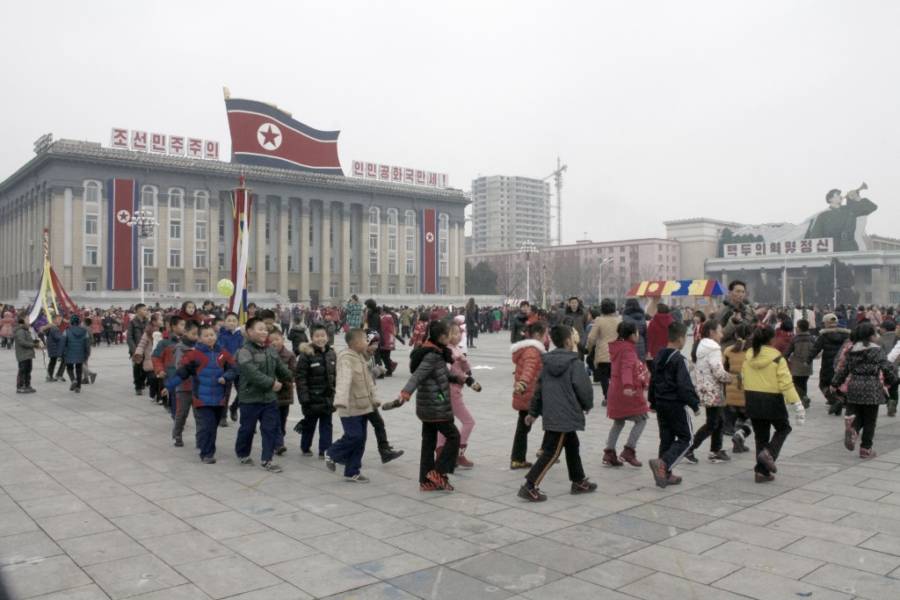Extraordinary Gift-Giving
"Meth, until recently, has been largely seen inside North Korea as a kind of very powerful energy drug -- something like Red Bull, amplified."
"[That very misconception underscores a] significant underestimation [within the country of the risks inherent in drug abuse]."
Andrei Lankov, North Korea expert, Kookmin University, Seoul, South Korea
"[Though illegal in the North it has obtained the cachet of legality] because officials take bribes to look the other way, and because the state indirectly benefits from a food chain of bribes that goes all the way to the top."
Justin Hastings, political scientist, University of Sydney, Australia
"For as long as drug use does not pose a challenge to the regime, but instead dulls the wills and minds of the North Korean people, the government tacitly allows it to go on."
Greg Scarlatoiu, executive director, Committee for Human Rights in North Korea, Washington
 |
| Kim Il-sung Square on Lunar New Year’s Day, 2017 Wikimedia Commons |
On the other hand, what is recognized as top priorities that the government places all its attention on is self-evident from the news, sometimes hysterical, that comes out of the hermit kingdom. Its development of long-range missiles, its preoccupation with 'defence' enabling it to lob viral warning to its perceived enemies, most of its neighbours whom the North believes have collaborated with the United States to undermine North Korea's progress. And its nuclear program, which has long alarmed the world at large.
This month during celebrations of the Lunar New Year, North Koreans have been exchanging gifts to one another. Choosing to present to those they care about, crystal meth. Methamphetamine, viewed by the outside world as a health and addiction threat has become in North Korea a casual, oft-used recreational and health aid. A powerful stimulant it may be, but in North Korea it is seen as beneficial to the user, used as lightly as smoking a cigarette. Its harmful effects evidently completely ignored.
The drug was originally introduced to the Korean Peninsula during the colonization period by occupying Japan. And during the 1970s North Korean diplomats were arrested while abroad, charged with drug smuggling. By the 1990s North Korea began manufacturing its own meth for export not too long after it sponsored local opium cultivation and opiate production, according to a study conducted by University of Missouri political scientist Sheena Chestnut Greitens.
Which opened a vigorous trade opportunity for the drug to be shipped across the border to China, or transferred at sea to the hands of criminal organizations such as Chinese triads or the Japanese yakuza, until the mid-2000s when government-sponsored meth production declined, leaving a surplus of people with manufacturing skills who began selling their product to the local market.
Though North Koreans in the face of a chronic shortage in health care have taken to self-help with the use of opiates and amphetamine-like stimulants, the government denies any of its citizens produce or make use of methamphetamine. Crystal meth, called "pingdu" as a transliteration of the Chinese word for "ice-drug", is customarily given as a gift, a particularly popular custom among young North Koreans.
 |
| Image via Shutterstock (L); and Flickr user Zennie Abraham, CC licence 2.0 (R) |
"Ice has become a best-selling holiday gift item. Most of the buyers are young people, even those still in middle school."
"They usually buy ice to snort together during holidays. They want to forget their harsh reality and enjoy themselves… Social stigmas surrounding drug use [have disappeared], so people now feel that something big is missing if they don’t have ice or opium prepared as a holiday gift."
DPRK Anonymous Source
Labels: Gift-Giving, Lunar New Year, Methamphetamine, North Korea

0 Comments:
Post a Comment
<< Home